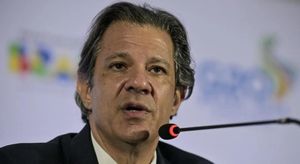On August 2, 2024, members of the ecological group Last Generation disrupted Taylor Swift's concert at PGE National Stadium, marking their latest act of civil disobedience aimed at raising awareness about climate change. This protest culminated with the activists fined by the Warsaw court, emphasizing the tensions between environmental activism and legal boundaries.
During the concert, approximately five members of Last Generation managed to blend with the crowd. They threw orange powder at the entrance of the stadium and glued themselves to the streets, effectively halting the black van thought to be transporting Swift. Carrying banners with messages like "We Can't Afford Billionaires" and "The Rich Live at Our Expense," the activists sought to spotlight the environmental damage caused by exorbitant lifestyles and private air travel popular among celebrities.
The judge presiding over the case acknowledged the activists' sincere motivation toward caring for the planet and recognizing the climate crisis. Nevertheless, the court decided the illegal nature of their actions warranted fines ranging from 200 to 400 zlotys (approximately $50 to $100). “While your concerns are valid,” the judge stated, “they do not justify breaking the law.”
Radomir Majewski, one of those fined, expressed their frustration after the ruling. “This sentence is cowardice on the part of the court. We are happy the court understands our motivations. But what good is it if they continue to protect billionaires whose extravagant lives have catastrophic effects on the rest of society?” Juxtaposing the activists’ plight with the broader socio-economic spectrum, Majewski pointed out, “The top 1% of the richest individuals are responsible for the same CO2 emissions as the poorest 5 billion people,” framing their protest as one of basic social justice as much as environmentalism.
The protestors’ actions, soon followed by their arrest, sparked debates around the effectiveness of civil disobedience versus lawful means of protest. Despite the legal repercussions, the group has vowed to fight the court's decision and has announced plans to escalate their campaigns. They advocate for greater public investment in sustainable transport systems rather than more highways and roads, as they underline the link between infrastructure expansion and environmental degradation.
The day of the protest was not just about blocking concert-goers but aimed at catalyzing discourse about the environmental costs of luxury and perceived indifference of the elite toward global warming. Their banners targeted billionaires directly, addressing what they see as equity issues compounded by climate change. “We are ordinary people who were punished for opposing the harms inflicted on us by the wealthy,” Majewski declared, underlining their cause's perceived injustice.
Though they are not the first activists to use high-profile events to make their statements, the high-profile nature of Swift’s concert certainly heightened their visibility. It brought attention not just to the fight against climate change but also to the interconnectedness of environmental negotiations and economic inequality.
Looking forward, Majewski and his peers are set to challenge the court's outcome. They have hinted at returning to the streets with renewed vigor as they plan regular protests starting next March. This announcement serves as both a challenge to authorities and a rallying call for those inspired by their cause, insisting their actions reflect the dire need for systemic change to tackle climate issues.
Majewski and his fellow activists remain resolute, stating, “We’re just getting started. Change will only come if we confront these issues directly. We intend to hold the power players accountable.” The sentencing of these protesters may well highlight the increasingly polarized attitudes toward environmental activism, pushing both citizens and lawmakers to reckon with the realities of climate change and the imperative need for actionable solutions.



